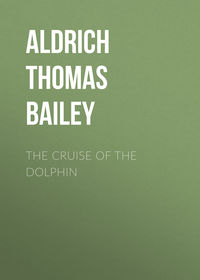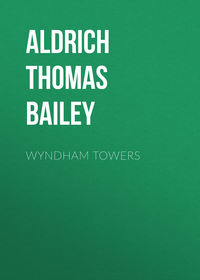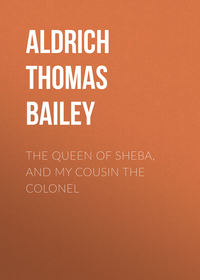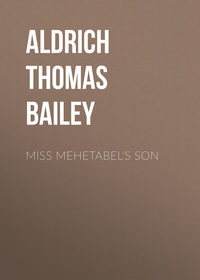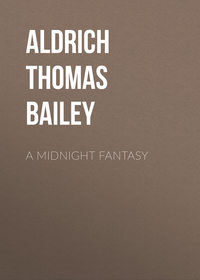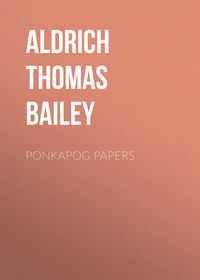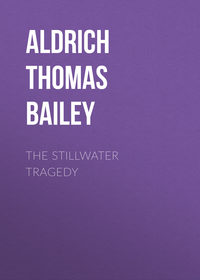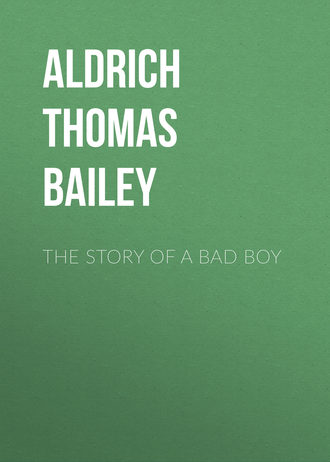 полная версия
полная версияThe Story of a Bad Boy
I was right in my surmises. He commanded me, in the most emphatic terms, never to go out in the Dolphin without leaving the mast in the boat-house. This curtailed my anticipated sport, but the pleasure of having a pull whenever I wanted it remained. I never disobeyed the Captain’s orders touching the sail, though I sometimes extended my row beyond the points he had indicated.
The river was dangerous for sailboats. Squalls, without the slightest warning, were of frequent occurrence; scarcely a year passed that six or seven persons were not drowned under the very windows of the town, and these, oddly enough, were generally sea-captains, who either did not understand the river, or lacked the skill to handle a small craft.
A knowledge of such disasters, one of which I witnessed, consoled me somewhat when I saw Phil Adams skimming over the water in a spanking breeze with every stitch of canvas set. There were few better yachtsmen than Phil Adams. He usually went sailing alone, for both Fred Langdon and Binny Wallace were under the same restrictions I was.
Not long after the purchase of the boat, we planned an excursion to Sandpeep Island, the last of the islands in the harbor. We proposed to start early in the morning, and return with the tide in the moonlight. Our only difficulty was to obtain a whole day’s exemption from school, the customary half-holiday not being long enough for our picnic. Somehow, we couldn’t work it; but fortune arranged it for us. I may say here, that, whatever else I did, I never played truant (“hookey” we called it) in my life.
One afternoon the four owners of the Dolphin exchanged significant glances when Mr. Grimshaw announced from the desk that there would be no school the following day, he having just received intelligence of the death of his uncle in Boston I was sincerely attached to Mr. Grimshaw, but I am afraid that the death of his uncle did not affect me as it ought to have done.
We were up before sunrise the next morning, in order to take advantage of the flood tide, which waits for no man. Our preparations for the cruise were made the previous evening. In the way of eatables and drinkables, we had stored in the stem of the Dolphin a generous bag of hard-tack (for the chowder), a piece of pork to fry the cunners in, three gigantic apple-pies (bought at Pettingil’s), half a dozen lemons, and a keg of spring-water—the last-named article we slung over the side, to keep it cool, as soon as we got under way. The crockery and the bricks for our camp-stove we placed in the bows, with the groceries, which included sugar, pepper, salt, and a bottle of pickles. Phil Adams contributed to the outfit a small tent of unbleached cotton cloth, under which we intended to take our nooning.
We unshipped the mast, threw in an extra oar, and were ready to embark. I do not believe that Christopher Columbus, when he started on his rather successful voyage of discovery, felt half the responsibility and importance that weighed upon me as I sat on the middle seat of the Dolphin, with my oar resting in the row-lock. I wonder if Christopher Columbus quietly slipped out of the house without letting his estimable family know what he was up to?
Charley Marden, whose father had promised to cane him if he ever stepped foot on sail or rowboat, came down to the wharf in a sour-grape humor, to see us off. Nothing would tempt him to go out on the river in such a crazy clam-shell of a boat. He pretended that he did not expect to behold us alive again, and tried to throw a wet blanket over the expedition.
“Guess you’ll have a squally time of it,” said Charley, casting off the painter. “I’ll drop in at old Newbury’s” (Newbury was the parish undertaker) “and leave word, as I go along!”
“Bosh!” muttered Phil Adams, sticking the boat-hook into the string-piece of the wharf, and sending the Dolphin half a dozen yards towards the current.
How calm and lovely the river was! Not a ripple stirred on the glassy surface, broken only by the sharp cutwater of our tiny craft. The sun, as round and red as an August moon, was by this time peering above the water-line.
The town had drifted behind us, and we were entering among the group of islands. Sometimes we could almost touch with our boat-hook the shelving banks on either side. As we neared the mouth of the harbor a little breeze now and then wrinkled the blue water, shook the spangles from the foliage, and gently lifted the spiral mist-wreaths that still clung along shore. The measured dip of our oars and the drowsy twitterings of the birds seemed to mingle with, rather than break, the enchanted silence that reigned about us.
The scent of the new clover comes back to me now, as I recall that delicious morning when we floated away in a fairy boat down a river like a dream!
The sun was well up when the nose of the Dolphin nestled against the snow-white bosom of Sandpeep Island. This island, as I have said before, was the last of the cluster, one side of it being washed by the sea. We landed on the river-side, the sloping sands and quiet water affording us a good place to moor the boat.
It took us an hour or two to transport our stores to the spot selected for the encampment. Having pitched our tent, using the five oars to support the canvas, we got out our lines, and went down the rocks seaward to fish. It was early for cunners, but we were lucky enough to catch as nice a mess as ever you saw. A cod for the chowder was not so easily secured. At last Binny Wallace hauled in a plump little fellow crusted all over with flaky silver.
To skin the fish, build our fireplace, and cook the chowder kept us busy the next two hours. The fresh air and the exercise had given us the appetites of wolves, and we were about famished by the time the savory mixture was ready for our clamshell saucers.
I shall not insult the rising generation on the seaboard by telling them how delectable is a chowder compounded and eaten in this Robinson Crusoe fashion. As for the boys who live inland, and know naught of such marine feasts, my heart is full of pity for them. What wasted lives! Not to know the delights of a clam-bake, not to love chowder, to be ignorant of lob-scouse!
How happy we were, we four, sitting crosslegged in the crisp salt grass, with the invigorating sea-breeze blowing gratefully through our hair! What a joyous thing was life, and how far off seemed death—death, that lurks in all pleasant places, and was so near!
The banquet finished, Phil Adams drew from his pocket a handful of sweet-fern cigars; but as none of the party could indulge without imminent risk of becoming sick, we all, on one pretext or another, declined, and Phil smoked by himself.
The wind had freshened by this, and we found it comfortable to put on the jackets which had been thrown aside in the heat of the day. We strolled along the beach and gathered large quantities of the fairy-woven Iceland moss, which, at certain seasons, is washed to these shores; then we played at ducks and drakes, and then, the sun being sufficiently low, we went in bathing.
Before our bath was ended a slight change had come over the sky and sea; fleecy-white clouds scudded here and there, and a muffled moan from the breakers caught our ears from time to time. While we were dressing, a few hurried drops of rain came lisping down, and we adjourned to the tent to await the passing of the squall.
“We’re all right, anyhow,” said Phil Adams. “It won’t be much of a blow, and we’ll be as snug as a bug in a rug, here in the tent, particularly if we have that lemonade which some of you fellows were going to make.”
By an oversight, the lemons had been left in the boat. Binny Wallace volunteered to go for them.
“Put an extra stone on the painter, Binny,” said Adams, calling after him; “it would be awkward to have the Dolphin give us the slip and return to port minus her passengers.”
“That it would,” answered Binny, scrambling down the rocks.
Sandpeep Island is diamond-shaped—one point running out into the sea, and the other looking towards the town. Our tent was on the river-side. Though the Dolphin was also on the same side, it lay out of sight by the beach at the farther extremity of the island.
Binny Wallace had been absent five or six minutes, when we heard him calling our several names in tones that indicated distress or surprise, we could not tell which. Our first thought was, “The boat has broken adrift!”
We sprung to our feet and hastened down to the beach. On turning the bluff which hid the mooring-place from our view, we found the conjecture correct. Not only was the Dolphin afloat, but poor little Binny Wallace was standing in the bows with his arms stretched helplessly towards us—drifting out to sea!
“Head the boat in shore!” shouted Phil Adams.
Wallace ran to the tiller; but the slight cockle-shell merely swung round and drifted broadside on. O, if we had but left a single scull in the Dolphin!
“Can you swim it?” cried Adams, desperately, using his hand as a speaking-trumpet, for the distance between the boat and the island widened momentarily.
Binny Wallace looked down at the sea, which was covered with white caps, and made a despairing gesture. He knew, and we knew, that the stoutest swimmer could not live forty seconds in those angry waters.
A wild, insane light came into Phil Adams’s eyes, as he stood knee-deep in the boiling surf, and for an instant I think he meditated plunging into the ocean after the receding boat.
The sky darkened, and an ugly look stole rapidly over the broken surface of the sea.
Binny Wallace half rose from his seat in the stem, and waved his hand to us in token of farewell. In spite of the distance, increasing every instant we could see his face plainly. The anxious expression it wore at first had passed. It was pale and meek now, and I love to think there was a kind of halo about it, like that which painters place around the forehead of a saint. So he drifted away.
The sky grew darker and darker. It was only by straining our eyes through the unnatural twilight that we could keep the Dolphin in sight. The figure of Binny Wallace was no longer visible, for the boat itself had dwindled to a mere white dot on the black water. Now we lost it, and our hearts stopped throbbing; and now the speck appeared again, for an instant, on the crest of a high wave.
Finally, it went out like a spark, and we saw it no more. Then we gazed at each other, and dared not speak.
Absorbed in following the course of the boat, we had scarcely noticed the huddled inky clouds that sagged down all around us. From these threatening masses, seamed at intervals with pale lightning, there now burst a heavy peal of thunder that shook the ground under our feet. A sudden squall struck the sea, ploughing deep white furrows into it, and at the same instant a single piercing shriek rose above the tempest—the frightened cry of a gull swooping over the island. How it startled us!
It was impossible any longer to keep our footing on the beach. The wind and the breakers would have swept us into the ocean if we had not clung to each other with the desperation of drowning men. Taking advantage of a momentary lull, we crawled up the sands on our hands and knees, and, pausing in the lee of the granite ledge to gain breath, returned to the camp, where we found that the gale had snapped all the fastenings of the tent but one. Held by this, the puffed-out canvas swayed in the wind like a balloon. It was a task of some difficulty to secure it, which we did by beating down the canvas with the oars.
After several trials, we succeeded in setting up the tent on the leeward side of the ledge. Blinded by the vivid flashes of lightning, and drenched by the rain, which fell in torrents, we crept, half dead with fear and anguish, under our flimsy shelter. Neither the anguish nor the fear was on our own account, for we were comparatively safe, but for poor little Binny Wallace, driven out to sea in the merciless gale. We shuddered to think of him in that frail shell, drifting on and on to his grave, the sky rent with lightning over his head, and the green abysses yawning beneath him. We fell to crying, the three of us, and cried I know not how long.
Meanwhile the storm raged with augmented fury. We were obliged to hold on to the ropes of the tent to prevent it blowing away. The spray from the river leaped several yards up the rocks and clutched at us malignantly. The very island trembled with the concussions of the sea beating upon it, and at times I fancied that it had broken loose from its foundation, and was floating off with us. The breakers, streaked with angry phosphorus, were fearful to look at.
The wind rose higher and higher, cutting long slits in the tent, through which the rain poured incessantly. To complete the sum of our miseries, the night was at hand. It came down suddenly, at last, like a curtain, shutting in Sandpeep island from all the world.
It was a dirty night, as the sailors say. The darkness was something that could be felt as well as seen—it pressed down upon one with a cold, clammy touch. Gazing into the hollow blackness, all sorts of imaginable shapes seemed to start forth from vacancy—brilliant colors, stars, prisms, and dancing lights. What boy, lying awake at night, has not amused or terrified himself by peopling the spaces around his bed with these phenomena of his own eyes?
“I say,” whispered Fred Langdon, at length, clutching my hand, “don’t you see things—out there—in the dark?”
“Yes, yes—Binny Wallace’s face!”
I added to my own nervousness by making this avowal; though for the last ten minutes I had seen little besides that star-pale face with its angelic hair and brows. First a slim yellow circle, like the nimbus round the moon, took shape and grew sharp against the darkness; then this faded gradually, and there was the Face, wearing the same sad, sweet look it wore when he waved his hand to us across the awful water. This optical illusion kept repeating itself.
“And I too,” said Adams. “I see it every now and then, outside there. What wouldn’t I give if it really was poor little Wallace looking in at us! O boys, how shall we dare to go back to the town without him? I’ve wished a hundred times, since we’ve been sitting here, that I was in his place, alive or dead!”
We dreaded the approach of morning as much as we longed for it. The morning would tell us all. Was it possible for the Dolphin to outride such a storm? There was a light-house on Mackerel Reef, which lay directly in the course the boat had taken, when it disappeared. If the Dolphin had caught on this reef, perhaps Binny Wallace was safe. Perhaps his cries had been heard by the keeper of the light. The man owned a lifeboat, and had rescued several people. Who could tell?
Such were the questions we asked ourselves again and again, as we lay in each other’s arms waiting for daybreak. What an endless night it was! I have known months that did not seem so long.
Our position was irksome rather than perilous; for the day was certain to bring us relief from the town, where our prolonged absence, together with the storm, had no doubt excited the liveliest alarm for our safety. But the cold, the darkness, and the suspense were hard to bear.
Our soaked jackets had chilled us to the bone. To keep warm, we lay huddled together so closely that we could bear our hearts beat above the tumult of sea and sky.
After a while we grew very hungry, not having broken our fast since early in the day. The rain had turned the hard-tack into a sort of dough; but it was better than nothing.
We used to laugh at Fred Langdon for always carrying in his pocket a small vial of essence of peppermint or sassafras, a few drops of which, sprinkled on a lump of loaf-sugar, he seemed to consider a great luxury. I don’t know what would have become of us at this crisis, if it hadn’t been for that omnipresent bottle of hot stuff. We poured the stinging liquid over our sugar, which had kept dry in a sardine-box, and warmed ourselves with frequent doses.
After four or five hours the rain ceased, the wind died away to a moan, and the sea—no longer raging like a maniac—sobbed and sobbed with a piteous human voice all along the coast. And well it might, after that night’s work. Twelve sail of the Gloucester fishing fleet had gone down with every soul on board, just outside of Whale’s-back Light. Think of the wide grief that follows in the wake of one wreck; then think of the despairing women who wrung their hands and wept, the next morning, in the streets of Gloucester, Marblehead, and Newcastle!
Though our strength was nearly spent, we were too cold to sleep. Once I sunk into a troubled doze, when I seemed to bear Charley Marden’s parting words, only it was the Sea that said them. After that I threw off the drowsiness whenever it threatened to overcome me.
Fred Langdon was the earliest to discover a filmy, luminous streak in the sky, the first glimmering of sunrise.
“Look, it is nearly daybreak!”
While we were following the direction of his finger, a sound of distant oars fell on our ears.
We listened breathlessly, and as the dip of the blades became more audible, we discerned two foggy lights, like will-o’the-wisps, floating on the river.
Running down to the water’s edge, we hailed the boats with all our might. The call was heard, for the oars rested a moment in the row-locks, and then pulled in towards the island.
It was two boats from the town, in the foremost of which we could now make out the figures of Captain Nutter and Binny Wallace’s father. We shrunk back on seeing him.
“Thank God!” cried Mr. Wallace, fervently, as he leaped from the wherry without waiting for the bow to touch the beach.
But when he saw only three boys standing on the sands, his eye wandered restlessly about in quest of the fourth; then a deadly pallor overspread his features.
Our story was soon told. A solemn silence fell upon the crowd of rough boatmen gathered round, interrupted only by a stifled sob from one poor old man, who stood apart from the rest.
The sea was still running too high for any small boat to venture out; so it was arranged that the wherry should take us back to town, leaving the yawl, with a picked crew, to hug the island until daybreak, and then set forth in search of the Dolphin.
Though it was barely sunrise when we reached town, there were a great many people assembled at the landing eager for intelligence from missing boats. Two picnic parties had started down river the day before, just previous to the gale, and nothing had been beard of them. It turned out that the pleasure-seekers saw their danger in time, and ran ashore on one of the least exposed islands, where they passed the night. Shortly after our own arrival they appeared off Rivermouth, much to the joy of their friends, in two shattered, dismasted boats.
The excitement over, I was in a forlorn state, physically and mentally. Captain Nutter put me to bed between hot blankets, and sent Kitty Collins for the doctor. I was wandering in my mind, and fancied myself still on Sandpeep Island: now we were building our brick-stove to cook the chowder, and, in my delirium, I laughed aloud and shouted to my comrades; now the sky darkened, and the squall struck the island: now I gave orders to Wallace how to manage the boat, and now I cried because the rain was pouring in on me through the holes in the tent. Towards evening a high fever set in, and it was many days before my grandfather deemed it prudent to tell me that the Dolphin had been found, floating keel upwards, four miles southeast of Mackerel Reef.
Poor little Binny Wallace! How strange it seemed, when I went to school again, to see that empty seat in the fifth row! How gloomy the playground was, lacking the sunshine of his gentle, sensitive face! One day a folded sheet slipped from my algebra; it was the last note he ever wrote me. I couldn’t read it for the tears.
What a pang shot across my heart the afternoon it was whispered through the town that a body had been washed ashore at Grave Point—the place where we bathed. We bathed there no more! How well I remember the funeral, and what a piteous sight it was afterwards to see his familiar name on a small headstone in the Old South Burying Ground!
Poor little Binny Wallace! Always the same to me. The rest of us have grown up into hard, worldly men, fighting the fight of life; but you are forever young, and gentle, and pure; a part of my own childhood that time cannot wither; always a little boy, always poor little Binny Wallace!
Chapter Fifteen—An Old Acquaintance Turns Up
A year had stolen by since the death of Binny Wallace—a year of which I have nothing important to record.
The loss of our little playmate threw a shadow over our young lives for many and many a month. The Dolphin rose and fell with the tide at the foot of the slippery steps, unused, the rest of the summer. At the close of November we hauled her sadly into the boat-house for the winter; but when spring came round we launched the Dolphin again, and often went down to the wharf and looked at her lying in the tangled eel-grass, without much inclination to take a row. The associations connected with the boat were too painful as yet; but time, which wears the sharp edge from everything, softened this feeling, and one afternoon we brought out the cobwebbed oars.
The ice once broken, brief trips along the wharves—we seldom cared to go out into the river now—became one of our chief amusements. Meanwhile Gypsy was not forgotten. Every clear morning I was in the saddle before breakfast, and there are few roads or lanes within ten miles of Rivermouth that have not borne the print of her vagrant hoof.
I studied like a good fellow this quarter, carrying off a couple of first prizes. The Captain expressed his gratification by presenting me with a new silver dollar. If a dollar in his eyes was smaller than a cart-wheel, it wasn’t so very much smaller. I redeemed my pencil-case from the treasurer of the Centipedes, and felt that I was getting on in the world.
It was at this time I was greatly cast down by a letter from my father saying that he should be unable to visit Rivermouth until the following year. With that letter came another to Captain Nutter, which he did not read aloud to the family, as usual. It was on business, he said, folding it up in his wallet. He received several of these business letters from time to time, and I noticed that they always made him silent and moody.
The fact is, my father’s banking-house was not thriving. The unlooked-for failure of a firm largely indebted to him had crippled “the house.” When the Captain imparted this information to me I didn’t trouble myself over the matter. I supposed—if I supposed anything—that all grown-up people had more or less money, when they wanted it. Whether they inherited it, or whether government supplied them, was not clear to me. A loose idea that my father had a private gold-mine somewhere or other relieved me of all uneasiness.
I was not far from right. Every man has within himself a gold-mine whose riches are limited only by his own industry. It is true, it sometimes happens that industry does not avail, if a man lacks that something which, for want of a better name, we call Luck. My father was a person of untiring energy and ability; but he had no luck. To use a Rivermouth saying, he was always catching sculpins when everyone else with the same bait was catching mackerel.
It was more than two years since I had seen my parents. I felt that I could not bear a longer separation. Every letter from New Orleans—we got two or three a month—gave me a fit of homesickness; and when it was definitely settled that my father and mother were to remain in the South another twelvemonth, I resolved to go to them.
Since Binny Wallace’s death, Pepper Whitcomb had been my fidus Achates; we occupied desks near each other at school, and were always together in play hours. We rigged a twine telegraph from his garret window to the scuttle of the Nutter House, and sent messages to each other in a match-box. We shared our pocket-money and our secrets—those amazing secrets which boys have. We met in lonely places by stealth, and parted like conspirators; we couldn’t buy a jackknife or build a kite without throwing an air of mystery and guilt over the transaction.
I naturally hastened to lay my New Orleans project before Pepper Whitcomb, having dragged him for that purpose to a secluded spot in the dark pine woods outside the town. Pepper listened to me with a gravity which he will not be able to surpass when he becomes Chief Justice, and strongly advised me to go.


